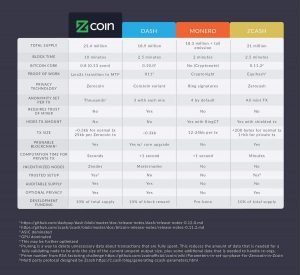Basics of Privacy based coins
With the continued explosion of crypto, privacy and security are still important considerations many people must face. Below I will cover why a user should be concerned with privacy, a few of the basic concepts behind privacy coins, and give a broad overview in general of the topic.
Privacy Concerns
With cryptocurrencies, people have their own public key and private key. The public key is the address that anyone can use to send you money. Unlike a bank account, however, there is no form of identification attached to this. There is no name, address etc. associated with the key.
However, there are certain features of some cryptos, say Bitcoin, that may inadvertently lead to privacy concerns. All transactions on the Bitcoin network are recorded and the transaction history can be traced all the way back to when the coin was first made. That means with some detective work, someone can find the amount of bitcoin and the transactions to and from associated with a particular address.
Privacy Coins
There is no best solution. There's various different solutions and they all try to solve this problem but they have advantages and disadvantages.
Dash
Dash uses a technology called CoinJoin. What it does is take a bunch of people who are trying to do a transaction, and you mix it up. You link the people together, pool up the resources, mix it together and now you have no idea who sent what to where.
There are some limitations to this method. It can only be used with predetermined amounts of the currency.
Monero
Not based on bitcoin blockchain technology but rather something called Cryptonote. This uses emissions and ring signatures. When making a Monero transaction, it creates a lot of dummy accounts to try and mix up the signal a bit. Unlike CoinJoin, it doesn't require a mixer and you have more flexibility in regards to the transaction amount.
There are disadvantages though. Recently, Monero discovered a bug with Cryptonote which allowed the creation of coins out of thin air. They found out about this bug before it went public however.
Zcash
Uses Zerocash technology or zk-SNARKS. Basically it is a shielded transaction that can shield both the amount transferred and also the senders.
Another interesting thing is that Ethereum is trying to incorporate zero cash technology into the ethereum network.

Dash is also a masternode coin. One masternode requires 1000 Dash and will generate 2 Dash per week for you. https://www.dash.org/masternodes2/
Dash is simply amazing
Great post, @boxmining, confidently Resteemed!
It's interesting that those 4 major privacy coins have almost the same total coin supply figures: 18-21 mln. This makes it much easier to trade/switch between them (easier to make price positioning and make the decision to purchase/switch).
But what about NAVcoin? Don't you think it is a great competitor in this niche? Or just too small yet to be included?
Great post! Didnt think about those monero concerns. Guess complete privacy has its pros and cons. Thanks for sharing
how about zcoin
adding that
add Navcoin too please. Good video
Dat DASH Doe! Lol, Keep up the good videos mate!
Hey thanks for all the great content. I've been watching your stuff on youtube for a while now and you have helped introduce me to this wonderful world of crypto. Keep up all the good work.
Which privacy coin do you like the best? I think Nav and Verge look good for small new coins, Obviously Dash and Zcash are the top dogs.
nice post
You forgot to mention Verge currency @boxmining, which is the best of all.
https://vergecurrency.com
I just heard about this one recently, I like to hear more about as well.
I like PIVX not only for its privacy features but also its community. There's something endearing about its videos, even though I know some people may not like them. The "home-made" feel as opposed to "slick, corporate" is actually a positive. To me at least. Its Twitter and discussion groups are often updated and fairly active.
Another privacy coin that I like is Navcoin. It was quiet for some time, with the price at below 0.30 for weeks. Then it exploded and went to near $2.00. Among other things, its security doesn't utilise some new exotic encryption but plain vanilla - and proven - AES.
In addition to Bitcoin, I'm betting on these two also to be around in the foreseeable future.